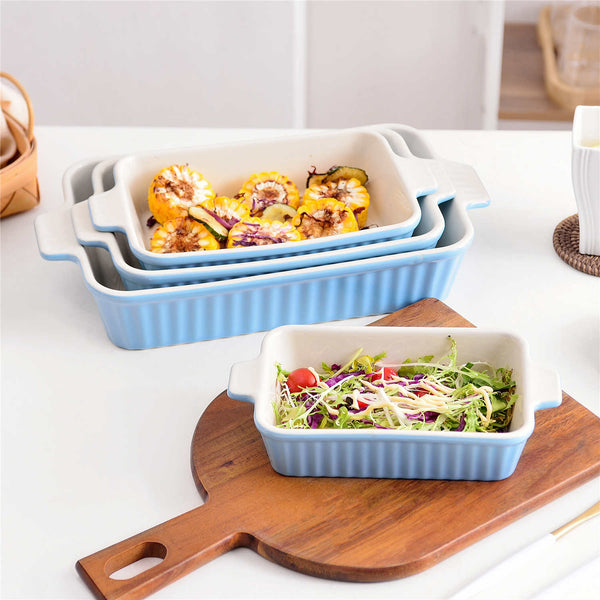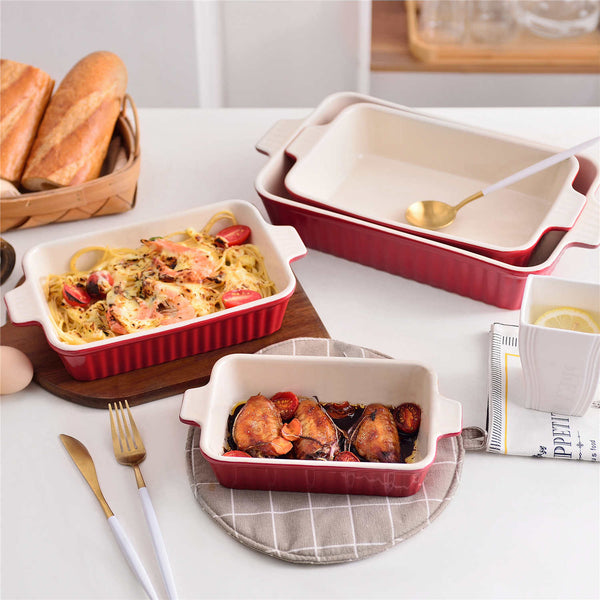Why You Should Switch to Non-Toxic Bakeware
Navigation
- Major Problems Caused By Toxins
- Potential Solutions And Key Benefits
- Identifying And Avoiding Toxic Materials In Bakeware
Bakeware is an essential part of every kitchen. Those who love baking truly understand the importance of good bakeware. But do you know bakeware can be a hidden source of dangerous and toxic chemicals? A large number of baking pans and dishes contain toxic chemicals. These toxic substances broadly include perfluorooctanoic acid (PFOA), and polytetrafluoroethylene (PTFE). In addition to these, many heavy metals such as lead and cadmium are also present that can leach into the food during the cooking process. All these chemicals have adverse effects on the human body.
Major Problems Caused By Toxins
The chemicals like PFOA and PTFE are usually found in non-stick coatings such as Teflon. PFOA is normally used in the manufacturing of PTFE and is widely popular for its ability to contaminate the environment. Its nature is quite persistent which means it doesn't break easily. This characteristic then increases its exposure to humans and the environment as a whole.
PFOA is widely associated with different health problems such as cancer, thyroid, and other kinds of developmental issues in infants and fetuses. On the other hand, PTFE remains stable at lower temperature levels but breaks at higher temperatures (normally above 260 degrees Celsius). PTFE is the biggest source of releasing toxic fumes that originate flu-like symptoms in humans. This type of flu is known as 'Teflon flu'.
Heavy metals such as lead and cadmium are often found in the glaze of ceramic bakeware. These metals enter in the food especially when the bakeware has signs of chipping, cracking or other forms of scratches. Exposure to lead can cause serious health issues such as neurological damage, compromised development in children and kidney problems, bone damage and cancer, etc. Both of these metals are very dangerous because they gather in the human body which further leads to chronic harmfulness.
To mitigate these risks, consumers should be very cautious in choosing the right bakeware. There are several safe alternatives available in the markets worldwide. For example, bakeware made of stainless steel, glass, and silicone are feasible options. Stainless steel is considered to be a durable option as it is resistant to high-temperature levels. It doesn't allow harmful chemicals to mix with food particles.
On the other hand, glass bakeware is also an excellent choice. It is also non-reactive to harmful chemicals. Silicone bakeware (the ones manufactured with high-quality silicone) is also a flexible and non-toxic option. It has the ability to withstand high-temperature levels and doesn't release harmful chemicals.
Potential Solutions And Key Benefits
Opting for non-toxic bakeware options such as stainless steel, porcelain,glass, and silicone has numerous health benefits and practical advantages. Such options of bakeware are feasible choices for anyone who wants to improve their cooking practices and overall well-being.
Health benefits of non-toxic bakeware
Decreased exposure to harmful chemicals: As mentioned earlier, non-toxic bakeware such as glass, and stainless steel don't contain harmful substances. These substances are widely present in traditional non-stick bakeware options. These coatings contain chemicals like PFOA and PTFE. They further release toxic fumes that enter the food, especially at high temperatures.
While considering non-toxic bakeware you are minimizing the risk of consuming these harmful substances that are the major cause of some severe health issues such as cancer, thyroid and developmental delays, etc.
Avoidance of heavy metal leaching: Some traditional and outdated bakeware have certain types of glazes and coatings that leach heavy metals such as lead and cadmium into the food. These metals are very toxic as they pile up in the human body over time. They originate serious health problems such as kidney issues, neurological damage and cancer, etc. So, opting for non-toxic bakeware options such as glass or high-quality ceramic can help you make yourself free and safe from these dangerous metals and enjoy safer food preparation.
Availability of non-reactive surfaces: Non-toxic bakeware such as glass or stainless steel are highly non-reactive in nature. It means that they don't react chemically with acidic or alkaline foods. This prevention of unwanted chemical reactions is quite beneficial as it stops the alteration of your food taste as well as the introduction of harmful substances. This feature is particularly beneficial when you are cooking or baking with items like tomatoes, vinegar or citrus, etc.
Practical benefits of non-toxic bakeware
Durability and longevity: Good quality glass and stainless steel bakeware are considered to be durable options. They have the capacity to survive high-temperature levels. They also can resist chipping, cracking, and scratching. They are widely considered as an excellent long-term investment option for your kitchen. Ceramic bakeware is slightly prone to chipping but if handled properly it can last for a long time.
Ease of cleaning: Non-toxic bakeware is normally easier to clean and maintain as compared to traditional non-stick bakeware. You can easily wash them using simple soap and water. They are typically dishwasher-safe. It reduces the danger of harsh chemical cleaners that can leave their remains on your bakeware and eventually in your food.
Versatility: Non-toxic bakeware is highly versatile. It can be used to meet a wide range of baking and cooking needs. For example, you can easily use glass bakeware from the freezer to the oven without any fear of chipping or cracking. Stainless steel bakeware is also suitable for baking as well as roasting.
Better cooking performance: Non-toxic bakeware provides an even distribution of heat as compared to traditional non-stick bakeware. It offers better cooking performance by baking goods evenly and offers more consistent results. Glass bakeware allows you to monitor the entire cooking process because of its transparency.
Identifying And Avoiding Toxic Materials In Bakeware
To ensure that your bakeware is free from any toxic chemicals, start by examining your material and the kind of coating involved. Never use bakeware that involves a non-stick coating like Teflon because it will most probably contain PFOA and PTFE. Always consider non-coated options especially those that are clearly labeled as PFOA, PTFE, and PFAS-free.
Be very cautious while using ceramic-coated bakeware. Always choose the brands that have products free from lead and cadmium. Moreover, it is also essential to avoid aluminum bakeware because it can leach into food especially when exposed to acidic ingredients.
We strongly recommend you explore the latest MALACASA's bakeware collection to find suitable bakeware to meet your baking needs. You can have a look at high-quality bakeware sets such as LOVECASA oval shaped bakeware set is easier to hold as it is a set with handles. It is made up of high-quality porcelain and is lead and cadmium-free. To order this amazing bakeware set, click here.
Switching to non-toxic bakeware sets such as glass, stainless steel, and high-quality ceramic is definitely a viable option as they can save you from different health issues. By successfully reducing the exposure to heavy metals you can enhance the quality of your cooking process. Always opt for non-toxic bakeware sets to make your cooking experience safer, healthier, and enjoyable. Invest in safer bakeware sets as it is a smart choice for those who want to prioritize their health and overall well-being.









Leave a comment